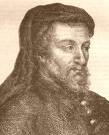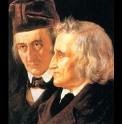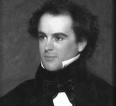History
All of the black text was taken from
All of the green text are ideas and information I want to add to Gillies outline.
# as a form the short story dates back to the oral tradition of the tale (Tales are not the same as short stories, but they are precursors. Tales generally focused on the great or terrible achievements of one person or group. The original oral tales tended to be short because of the listener’s attention span. )
# written tales emerge in poetic forms - Chaucer's Canterbury Tales

Geoffrey Chaucer
# Boccaccio's Decameron (1351-1353) often cited as the precursor of the short story form, as is the French translation of The Thousand and One Nights (1704) (There is no real plot, simply one person’s actions held up for a morality lesson, a slap at the Catholic church, or an amusing unbelievable story.In the The Thousand and One Nights we are given the unbelievable idea that a woman can tell such wonderful stories as to prevent the man from chopping her head off in the morning--we quickly stop referring to the woman/man issue and continue with the tales.)

Boccaccio
# short story really begins to emerge as a form in the 19th century (The short story begins to develop plots, characters, and to make analyses of world issues.)
# Grimm's Fairy Tales (1824-1826) an early collection of folk stories that paved the way for the development of the genre of short stories.

Brothers Grimm
# early and mid 19th century saw the rise of the short story in America. For example: Hawthorne's Twice Told Tales (1842) and Poe's Tales of the Grotesque and Arabesque (1836) set a standard for one branch of short fiction - the gothic (Gothic stories can be very broadly defined as stories with any paranormal event.) 
Nathaniel Hawthorne
# mid and late 19th century saw the blossoming of the short story in Britain - Hardy's Wessex Tales (1888) first major success of a volume of short stories (Note American short stories developed more quickly than European. This is true simply because people in this hemisphere were continually moving and unable to keep up with papers serializing novels. The people of Europe were not constantly moving and had developed the reading of novels and attendance at plays as common entertainment.)

Thomas Hardy
# the proliferation of literary magazines and journals in the latter 25 years of the 19th century created a market demand for short fiction - stories between 3,000 - 15,000 words
# short story peaks as a form in the mid 20th century and while still respected, it has become less marketable than its prose cousin, the novel (This idea of popularity is actually a pendulum. At this time, short stories are enjoying a resurgence due to the Internet.)
# Poe (on Hawthorne): he finds "a certain unique or single effect to be wrought out" and "he then invents such incidents - he then combines such events as may best aid him in establishing this preconceived effect ... In the whole composition there should be no word written, of which the tendency, direct or indirect, is not to one preestablished design."
# Poe on plot: "A short story in which nothing at all happens is an absolute impossibility."
# Thomas Hardy: "A story must be exceptional enough to justify its telling ... Therein lies the problem - to reconcile the average with that uncommonness which alone makes it natural that a tale of experience would dwell in the memory and induce repetition"
